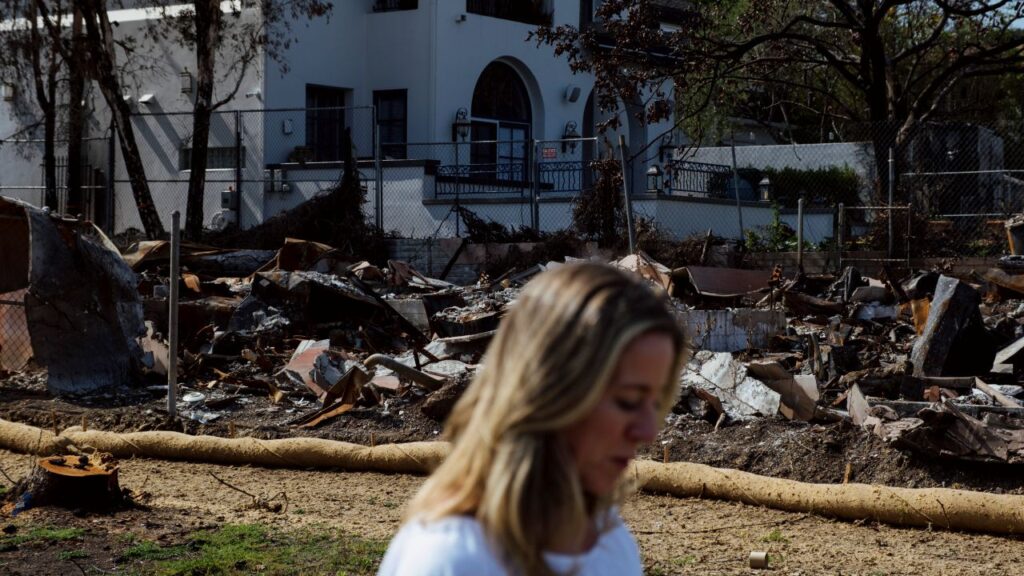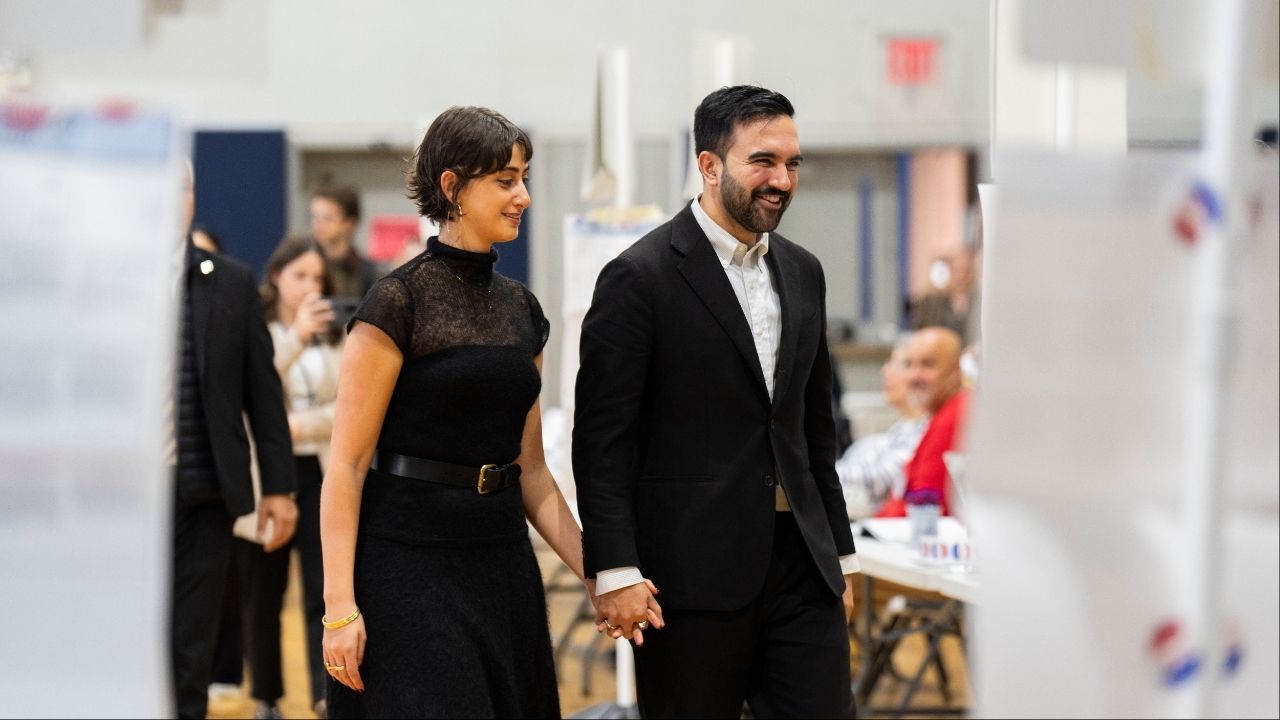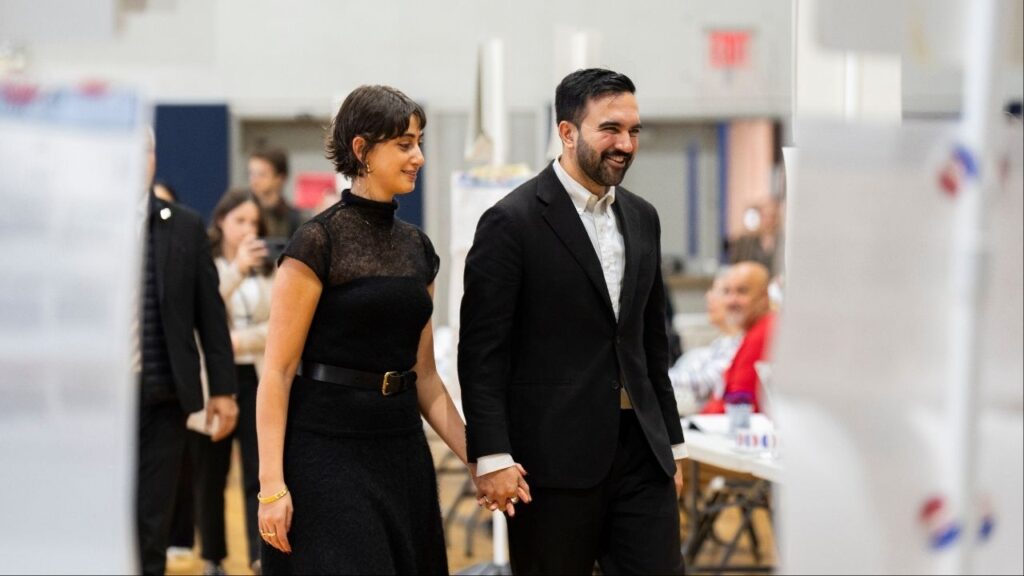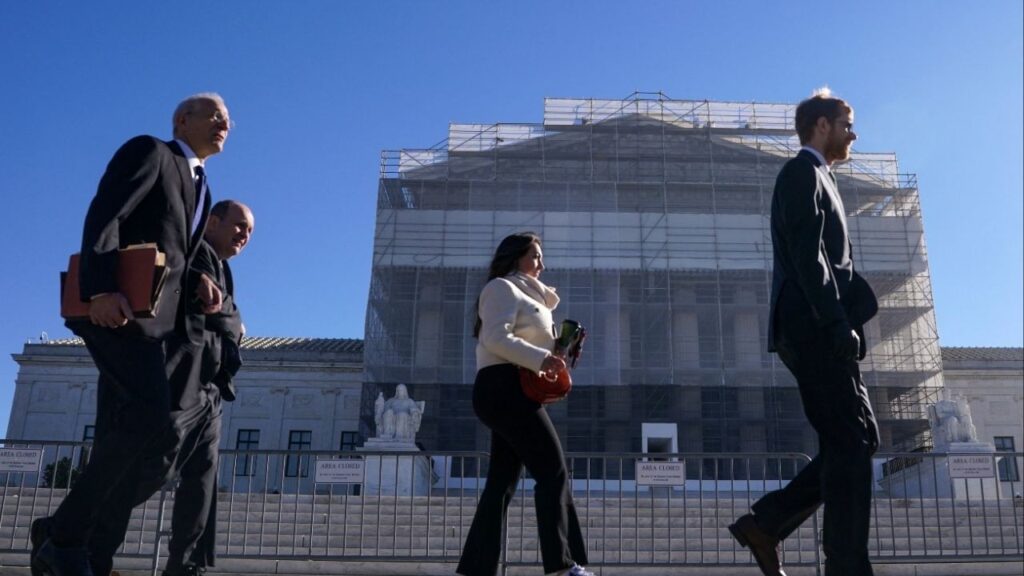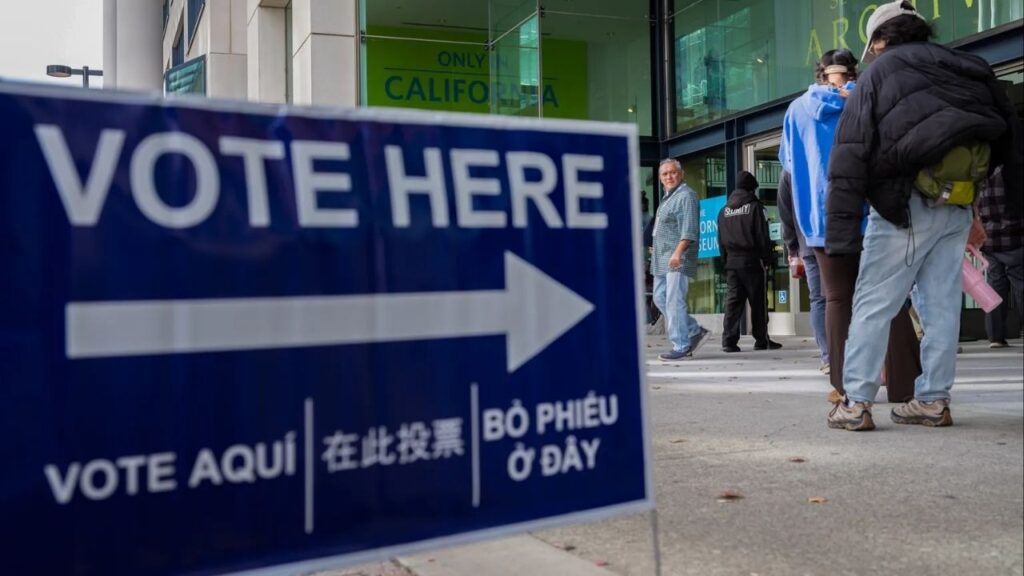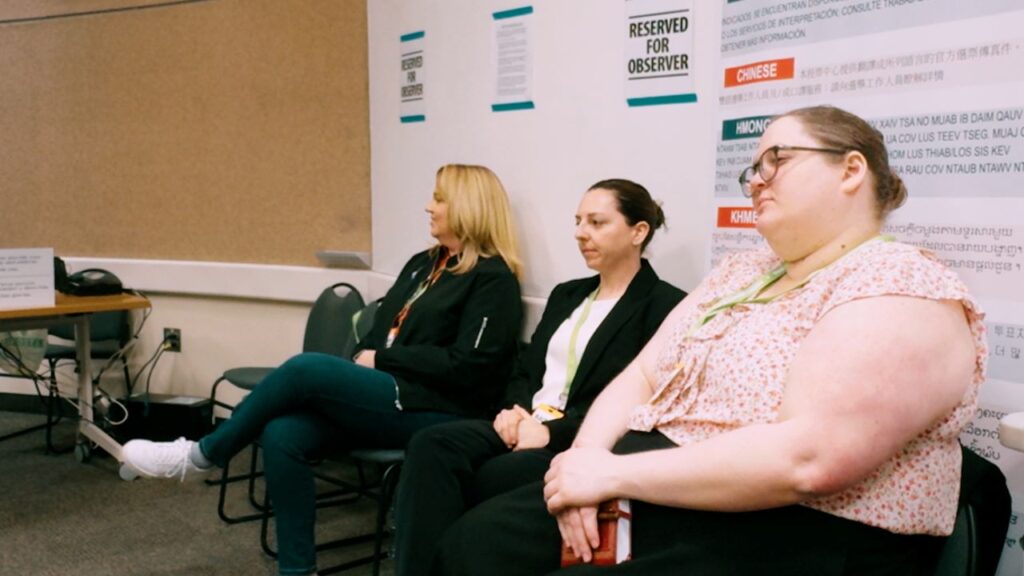State Assemblyman Zohran Mamdani, the Democratic nominee for mayor, and his wife, Rama Duwaji, arrive to cast their ballots at a polling place in Queens on Tuesday morning, Nov. 4, 2025. Mamdani told his wife months ago of his doubts of winning the mayoralty. (Amir Hamja/The New York Times)
Share
|
Getting your Trinity Audio player ready...
|
NEW YORK — Zohran Mamdani was still asleep early in the morning after June’s Democratic primary when the phone calls started flooding in.
A young democratic socialist, Mamdani had just toppled former Gov. Andrew Cuomo, upending New York’s power structure in an upset so stunning and so swift that even he had not fully seen it coming.
Now, titans of the city establishment were clogging up the phones of the candidate and his small team. Most did not sound happy.
“It’s a great day in New York,” Morris Katz, Mamdani’s 26-year-old political adviser, told real estate magnate William C. Rudin in one of the conversations.
The businessman paused. That’s certainly not how I see it, he replied.
It took just hours to become clear that the power brokers and civic gatekeepers accustomed to running New York saw Mamdani’s ascent as something closer to a hostile takeover.
A top aide for Cuomo was phoning unions and Democratic officials urging them to withhold support. Old real estate friends soon began pitching President Donald Trump on a possible White House intervention.
Mamdani’s political rise may be remembered for his buoyant primary run that united a new coalition around the city’s growing affordability crisis.
But his election Tuesday as the 111th mayor of New York owes as much to the backroom campaign that followed.
The arc of his success is staggering. At the start of the year, Mamdani was polling at 1%. Few New Yorkers recognized his name, and his own political team put the odds of winning as low as 3%.
Now, at age 34, he will be New York City’s youngest leader in more than a century. He will also be the first Muslim mayor and the first South Asian.
This account of how he did it draws from interviews with Mamdani’s top advisers and allies, as well as his critics and rivals. Many spoke on condition of anonymity.
Ignoring the Referees
As Mamdani began sketching out a potential campaign a year earlier, his challenge was far more basic: getting noticed at all.
A backbench state Assembly member who had immigrated to New York City at age 7, he had almost no citywide profile. Even fellow socialists thought his views on policing and Israel would put a hard ceiling on his support. And the field running against the scandal-plagued mayor, Eric Adams, was growing by the day.
Mamdani later told an ally that he had confided in his then-fiance, Rama Duwaji, that he didn’t really think he could win. The goal was to build a template for the kind of muscular leftist campaign that might one day crack the Democratic establishment’s hold.
Forget the New York conjured by political strategists, one future adviser, Zara Rahim, told him last summer. Make a campaign about the actual New York City.
The campaign decided to forgo selling branded swag, a revenue stream for many candidates, and instead produced special items in limited quantities that could only be earned, incentivizing supporters to give not money but time.
It hosted events — a scavenger hunt, a soccer tournament — that opponents laughed off as gimmicks but attracted thousands of supporters. Many later became part of an unmatched army of volunteers.
The contrast to Cuomo could not have been more jarring. The scion of a political dynasty, he had been run out of the governor’s office in a sexual harassment scandal. But when he entered the race in March, he acted as if he were still in charge.
He rarely appeared in public, threatened unions and fellow Democrats into creating an air of inevitability around him and relied on $25 million in big-money donations to a super political action committee supporting him.
By the time Mamdani and aides gathered at a Holiday Inn on June 24, primary night, they thought their approach was working. But they were so certain they would not win outright that first night that they had not prepared a victory speech.
Yet not long after 10 p.m., Mamdani found himself letting congratulatory calls go to voicemail, as he and a shocked clutch of aides raced to write one.
Everything Is About to Change
Inside the campaign, Mamdani and his advisers were exhausted. They had planned to plot their next steps while on retreat for a week. They had mere hours to face a new reality.
Everything is about to change, Rahim and Katz told Mamdani.
He would need to quadruple his staff, delicately reassign longtime aides to less high-profile roles and begin more seriously planning for the possibility that he could be mayor, they said. If he needed any reminder, a police detail now accompanied his every movement.
Some post primary consolidation came quickly, especially as labor unions and local party leaders embraced his candidacy. But others, including some of the nation’s top Democrats, held back, worried that associating with Mamdani’s far-left views could tank the party’s chances in next year’s midterms.
Adams, who sat out the primary, looked to be regaining strength with support from the city’s business class. Cuomo threw himself back into the race as an independent with a newfound furor after a brief retreat.
Mamdani also took a post-primary break, traveling to Uganda in late July for a long-planned marriage celebration at a family compound.
Seven thousand miles away, back in New York, a gunman walked into a midtown Manhattan office tower and carried out a deadly mass shooting, including killing an off-duty police officer. The attacker had targeted a building that happened to house Rudin’s offices and killed one of his employees.
Aides woke Mamdani in the night to put out a statement, and he rushed to get back to New York City. But by the time he landed two days later, Cuomo was on television screens across the city all but blaming his opponent, who once called for defunding the police, for the massacre.
It was a disaster. And the unfavorable optics might have changed the course of the whole campaign, but for one twist of fate: The officer killed turned out to be Bangladeshi and Muslim. The family invited the candidate to join them at home, and he arrived directly from Kennedy Airport.
Afterward, he called a news conference that would be his longest since primary day. He chastised Cuomo for politicizing the moment but also used the platform to stress that his views on policing had evolved from the days when he called for funding cuts.
For the first time in weeks, aides breathed a sigh of relief.
“To me, it was the first moment I felt like he was the mayor of New York,” Katz said.
A C-Suite Charm Offensive
Mamdani knew he still had a problem.
No mayor has led New York without at least some tacit support from the business elite since the fiscal crisis of 1970s. Running aggressively against them had worked in the primary, but as summer slid toward fall, his advisers worried that leaders of the group could push both Adams and Curtis Sliwa, the Republican nominee, out of the race.
A one-on-one matchup with Cuomo in the general election could be disastrous.
Mamdani got busy. He asked Kathryn S. Wylde, the head of the Partnership for New York City, for a list of every major business leader he should call and began reaching out one by one.
The only child of two prominent cultural figures, Mamdani was at ease with rich and powerful people. He explained why his core positions would not change, but he also solicited advice and signaled more flexibility than his reputation suggested.
His goal was to expand free child care and buses, Mamdani said in some groups, but he was open to scrapping a proposed tax hike if he could find another funding stream.
At a packed meeting with the Association for a Better New York, a civic-minded group of business leaders, he surprised attendees by proposing a regulatory change developers had longed for to speed up construction.
Some who were expecting a strident ideologue came away impressed. For others, his willingness to engage was at least a welcome contrast to former Mayor Bill de Blasio, a progressive who had made a point of thumbing his nose at Manhattan elite, and to Cuomo’s bruising style.
Mamdani also took on a new tone with fellow Democrats.
He had been a thorn in Gov. Kathy Hochul’s side for years, once saying her actions were why “people don’t trust politicians.” But he knew she had the trust of business leaders and would hold the keys to moving his ambitious plans through Albany.
When the pair sat down in late June, he apologized for his earlier criticism of her and asked to work together, particularly around a shared interest in child care.
Hochul was pleasantly surprised. She initially told Mamdani that she would consider endorsing him, but she wanted him to agree to keep Jessica Tisch, a well-respected technocrat appointed by Adams, as police commissioner. Mamdani initially balked, explaining he had never even met her.
The question cut to the heart of one of the campaign’s leading conflicts: How far could Mamdani go courting the powerful without compromising his beliefs or alienating his progressive base?
Ultimately, Hochul endorsed Mamdani in September after he agreed to involve her when he selected a commissioner. Weeks later, after private conversations with Tisch, Mamdani said publicly he intended to keep her.
A similar argument played out around how forcefully Mamdani should distance himself from “globalize the intifada,” a phrase that many Jewish New Yorkers heard as a call to violence.
Mamdani, a pro-Palestinian activist, told business leaders in July that he would “discourage” the use of the phrase, but the decision not to condemn it outright helped fan a backlash that aided Cuomo.
Mamdani’s harsh criticism of Israel played a role in another, less successful courtship of former Mayor Mike Bloomberg.
The campaign struggled to get a meeting, but when the two finally met at Bloomberg’s midtown headquarters this fall, they spent a convivial hour talking. Bloomberg had privately told associates over the summer he was done with Cuomo. Mamdani left the meeting thinking he had done enough to keep it that way.
He was wrong.
Angry over Mamdani’s comments on Israel and worried about his inexperience, Bloomberg ultimately sent $5 million to two super PACs attacking Mamdani and re-upped his endorsement of Cuomo — but did so only six days before Election Day.
By then it was too late.
—
This article originally appeared in The New York Times.
By Nicholas Fandos/Amir Hamja
c. 2025 The New York Times Company
RELATED TOPICS:
Categories

UPS Cargo Plane Crashes in Louisville, Killing at Least 9

Don’t Panic yet, Investors Say, as High-Flying AI Stocks Tumble
